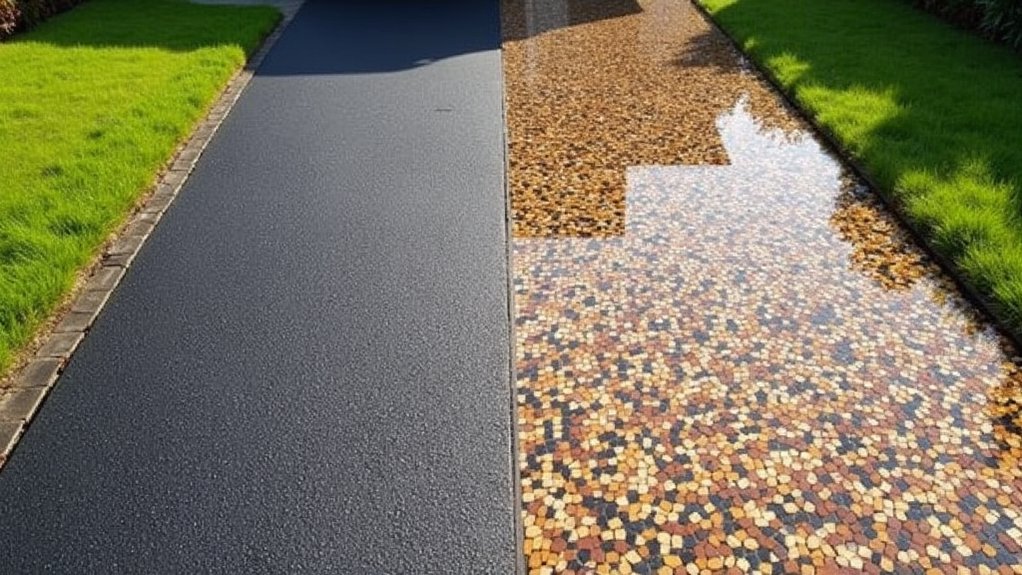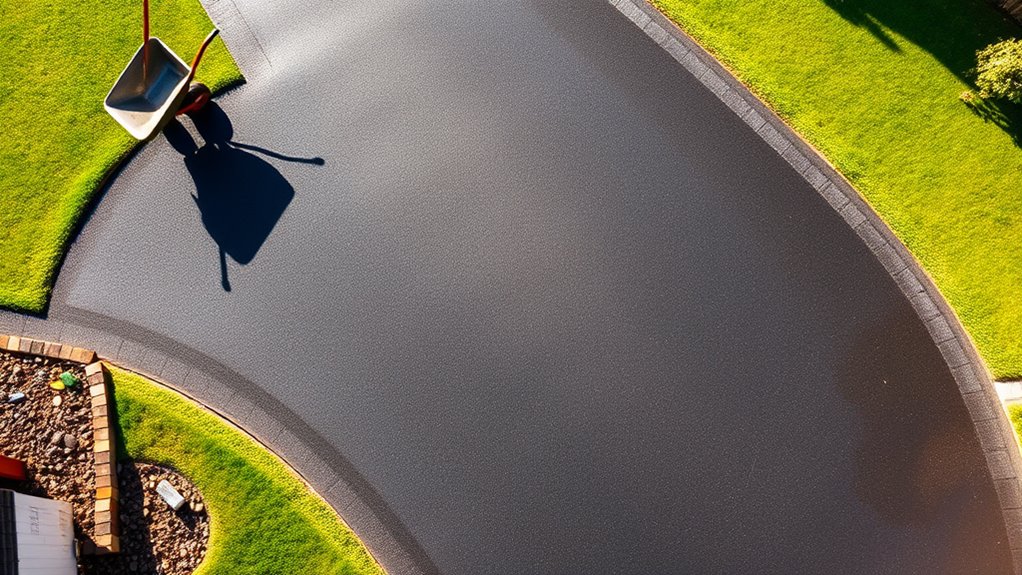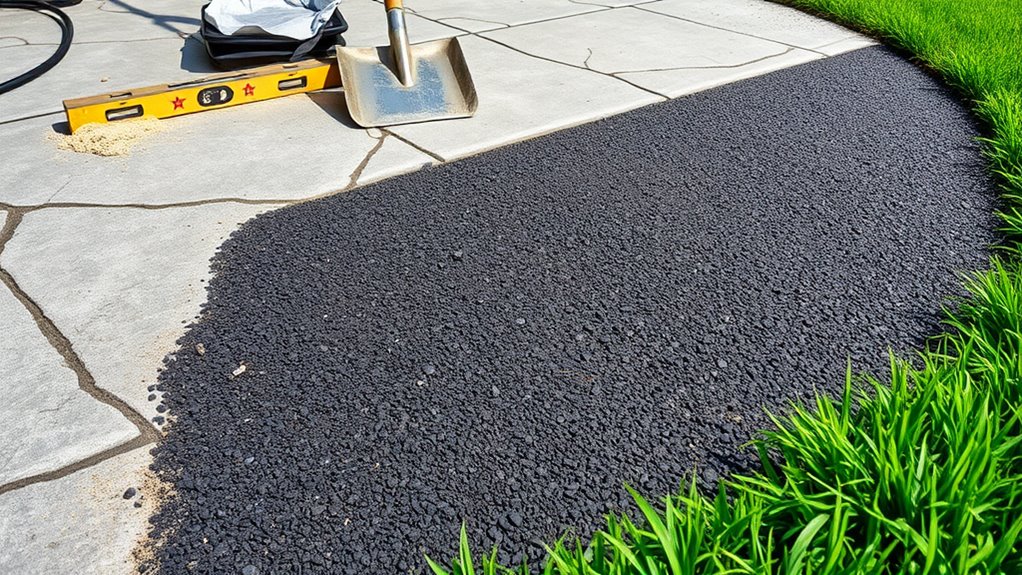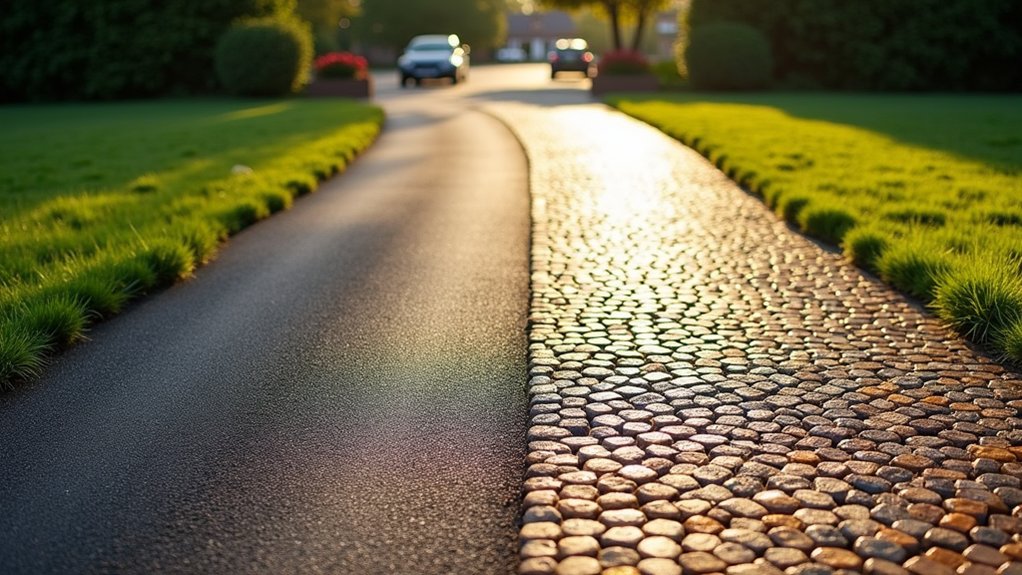When comparing tarmac and resin driveways, tarmac is usually the more budget-friendly option. It costs around £50 per square metre, with total installation prices ranging from £2,200 to £7,000. On the other hand, resin driveways start at £70 to £100 per square metre, along with higher installation costs. While tarmac is cheaper initially, resin offers enhanced aesthetics and greater durability. Consider the long-term benefits of your choice before deciding.
Table of Contents
ToggleKey Takeaways
Tarmac costs around £50 per square metre, making it a more affordable option than resin driveways, which start at £70-£100 per square metre.
Installation for tarmac ranges from £2,200 to £7,000, while resin installation typically comes in at £60 to £100 per square metre. However, tarmac needs regular maintenance, such as sealing every 2 to 5 years, which can add to long-term expenses.
On the other hand, resin driveways can last up to 25 years with minimal upkeep, which might balance out the initial higher costs. Additionally, the aesthetic versatility of resin driveways can enhance your property’s value over time, making the investment worthwhile.
Overview of Tarmac and Resin Driveways
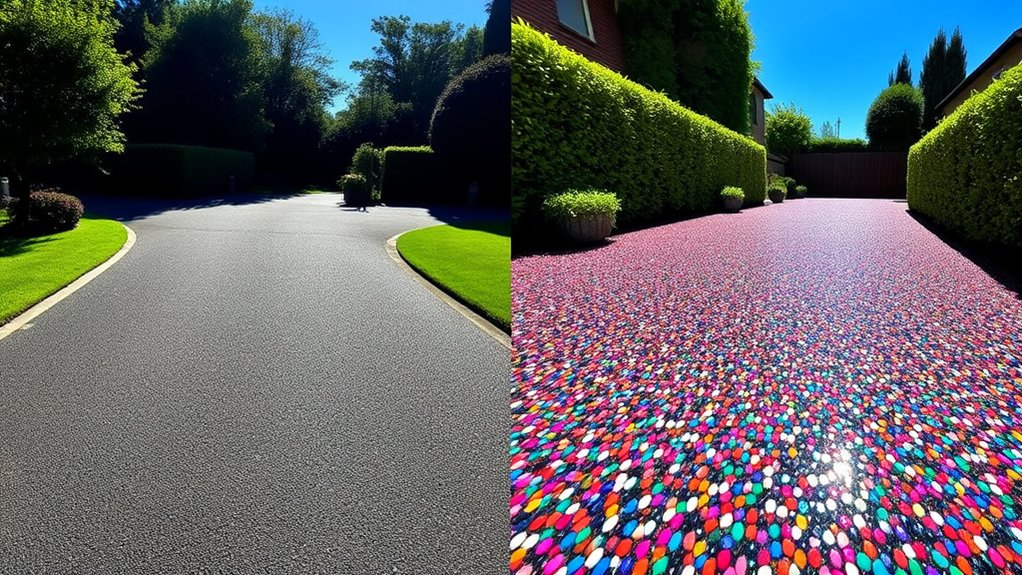
When choosing a driveway, tarmac and resin options each have unique features. Tarmac, made from crushed stone and bitumen, gives a smooth, black surface that’s tough and can handle heavy vehicles. Additionally, tarmac’s long lifespan makes it an excellent investment for homeowners looking for durability. Tarmac driveways typically last between 15 to 20 years with proper maintenance, making them a reliable choice for many households.
On the other hand, resin driveways mix resin with decorative aggregate stones, allowing for a variety of textures and styles that can mimic natural stone. One key difference is that tarmac is impermeable, meaning it doesn’t allow water to drain through, while resin driveways are semi-permeable, which helps with water drainage. Resin driveways also offer unique design options that can enhance the aesthetic appeal of your property. Tarmac can be installed quickly, while resin requires a more complex, multi-layer process for that added custom look. Knowing these differences will help you decide which driveway suits your needs better.
Material Costs Comparison
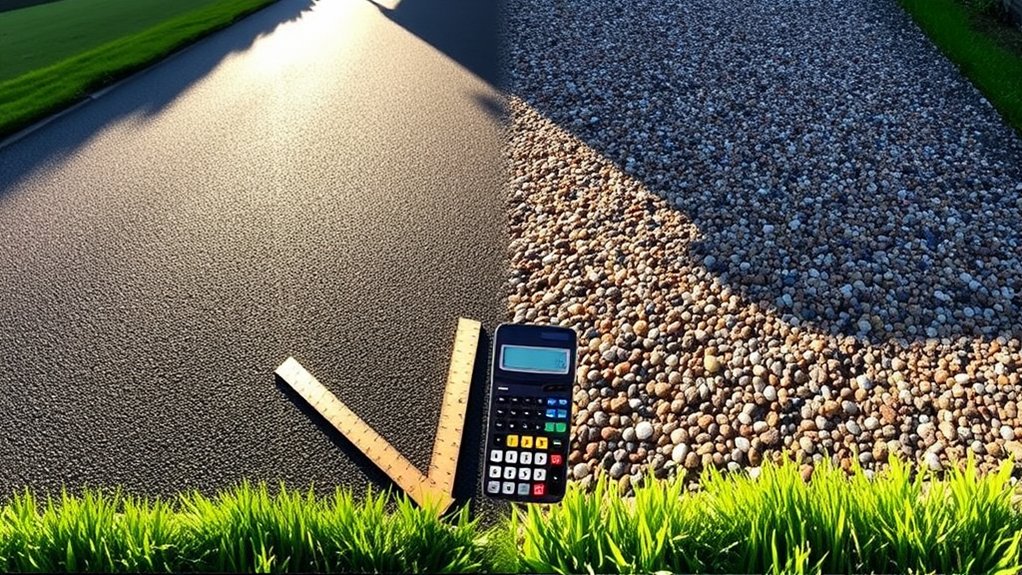
When comparing tarmac and resin driveways, it’s clear that their material costs differ significantly.
Tarmac is typically priced around £50 per square metre in the UK, making it a budget-friendly option. This is largely due to its use of readily available bituminous materials.
On the other hand, resin driveways start at £70-£100 per square metre. The higher price reflects the quality of materials and the complexity of the installation process, which involves specialised aggregates and precise mixing. If you opt for coloured resins, expect to pay even more.
In summary, if cost is your main concern, tarmac is the more economical choice.
However, if you’re after enhanced aesthetics and are willing to spend more, resin is worth considering. A key advantage of resin driveways is their minimal maintenance requirements, ensuring that they remain in pristine condition for years to come.
Think about your priorities before making your decision.
Installation Costs Breakdown
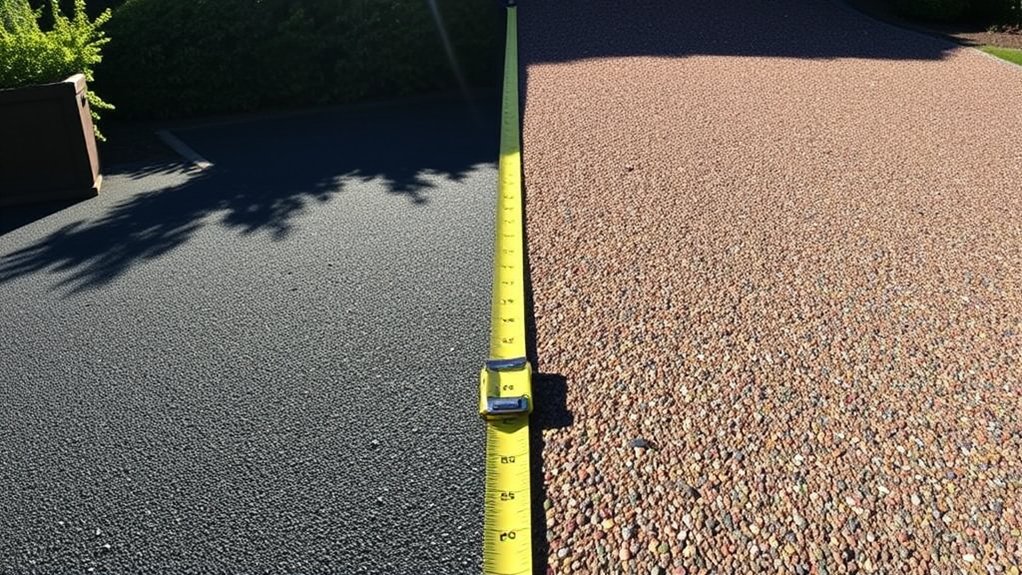
Installation costs for tarmac and resin driveways can vary significantly due to several factors. Tarmac generally costs between £2,200 and £7,000, depending on installation methods and site preparation. You must consider excavation and waste removal for both options; however, tarmac requires a specific sub-base, which can increase costs. For resin driveways, prices are typically charged per square metre, ranging from £60 to £100. While the application process is less labour-intensive, it does require specialised equipment. Additionally, regional labour rates and site conditions can further influence expenses. Proper drainage planning is crucial for both types to ensure durability, as proper installation ensures long-term value through durability and low maintenance. Ultimately, hiring professionals can enhance the quality of the finish, which will affect your final installation costs. Asphalt driveways are generally more affordable than brick driveways, which can influence your choice between materials.
Longevity and Maintenance Considerations
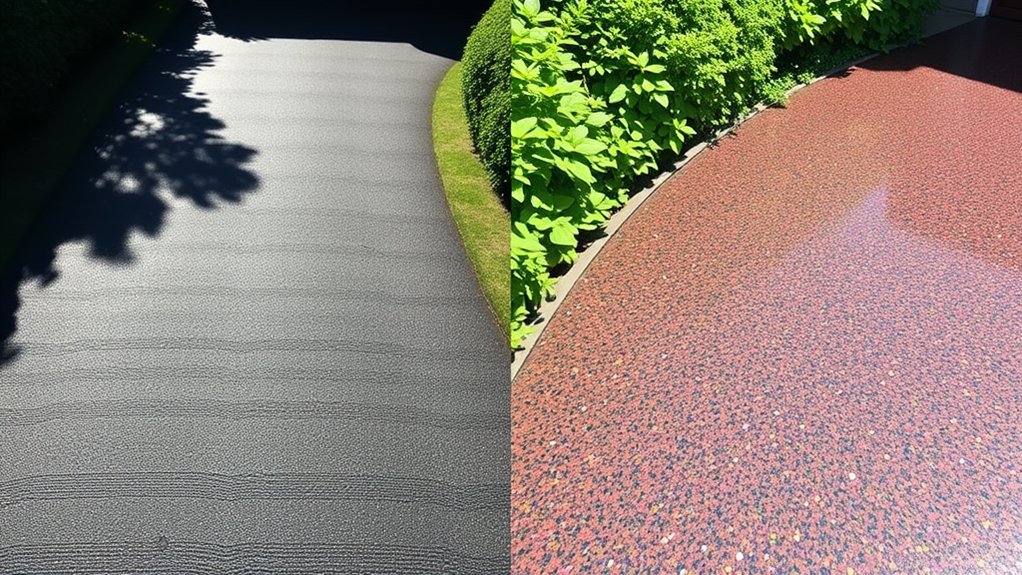
Understanding the longevity and maintenance needs of tarmac and resin driveways is crucial for your decision-making.
Tarmac typically lasts between 15 to 20 years, potentially extending to 25 years with proper installation. Factors such as installation quality and local weather can affect its lifespan, and heavy traffic from vehicles may shorten it.
Resin driveways also have a lifespan of 15 to 25 years, offering better flexibility and resistance to the weather. They require less maintenance—usually just the occasional power wash, with no need for sealcoating.
In contrast, tarmac requires regular inspections and repairs to avoid structural damage, while resin driveways demand minimal upkeep.
Environmental Impact Analysis
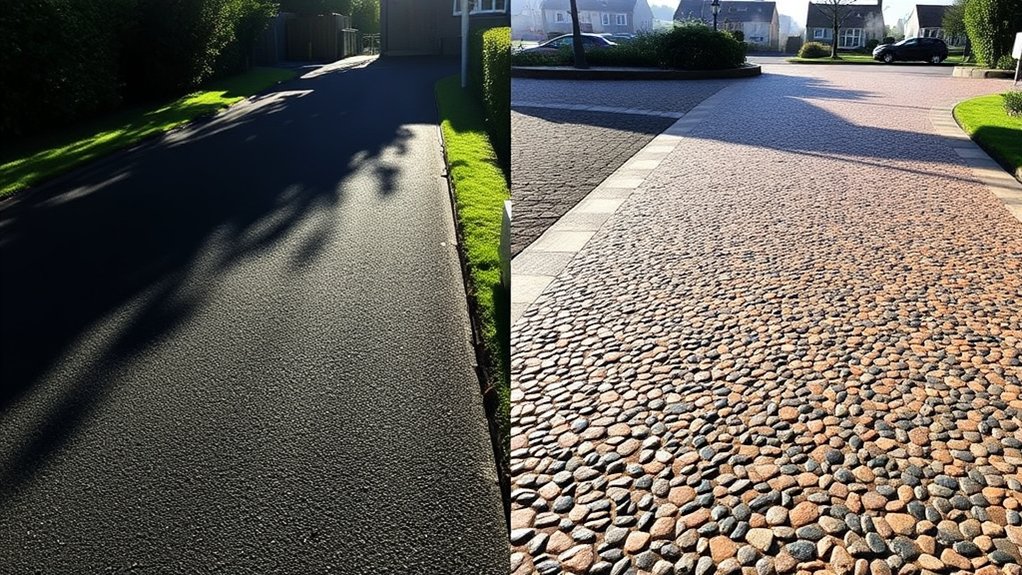
When assessing the environmental impact of driveway options, it’s crucial to compare tarmac and resin driveways. The production of tarmac is resource-heavy, leading to habitat destruction, greenhouse gas emissions, and water pollution from stormwater runoff.
On the other hand, resin driveways provide notable environmental advantages, such as permeability that reduces runoff and lowers the risk of flooding. They tend to be less disruptive to local ecosystems and can utilise materials with a lower environmental impact.
Aesthetic Options and Design Flexibility
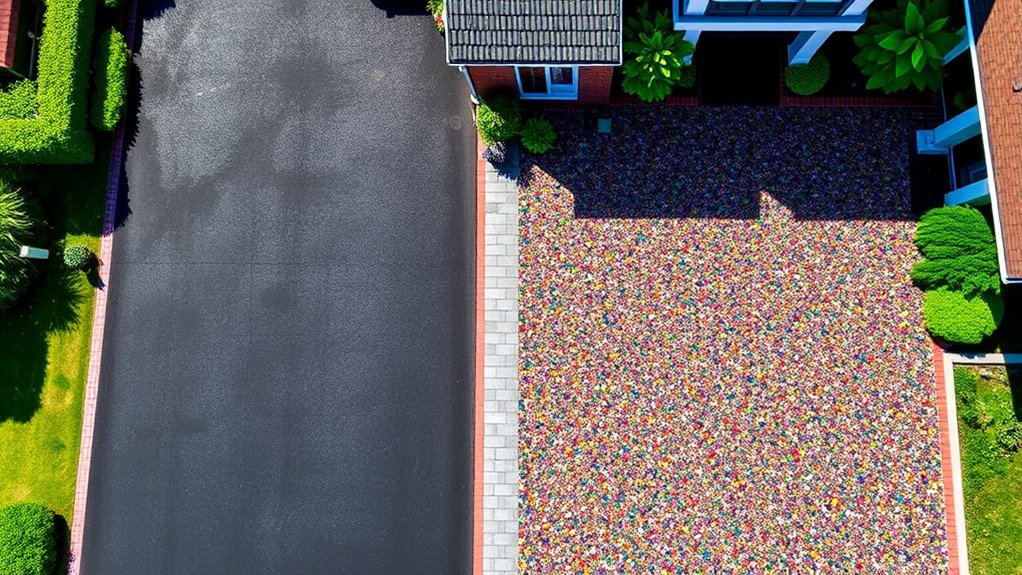
When it comes to aesthetic options and design flexibility, resin driveways really excel.
They offer a wide range of colours and patterns that you can customise to suit your home. You can even mix different aggregates to create a distinctive look or add intricate designs and borders.
On the other hand, tarmac provides a more uniform appearance with fewer colour options, making it less adaptable for those seeking a personalised touch.
Color Variety Options
Colour variety options are crucial for the aesthetic appeal and design flexibility of tarmac and resin driveways. Tarmac typically comes in classic dark grey or black, but innovations like ULTICOLOUR have introduced some vibrant shades to keep up with modern trends.
In comparison, resin driveways offer a far greater range of colours, from soft neutrals to bold shades, allowing for tailored designs to suit individual preferences. Resin’s ability to blend colours and maintain consistency over time makes it particularly appealing for custom projects.
While tarmac can provide some colour options, it generally leans towards more uniform and traditional designs, which limits its versatility compared to resin.
Pattern Design Choices
When choosing between tarmac and resin driveways, consider the variety of pattern designs that can enhance both appearance and functionality.
Tarmac provides flexibility with options like circular patterns and the use of paving stones, giving a classic finish. You can also add style by edging tarmac with brick or metal.
On the other hand, resin driveways allow for custom designs, such as herringbone or fan shapes, and can incorporate coloured aggregates for a unique look.
However, resin can be pricier, which might be a concern for those on a budget.
Both materials have their advantages in terms of design, so your decision will ultimately hinge on your personal style and budget.
Budgeting for Your Driveway Project
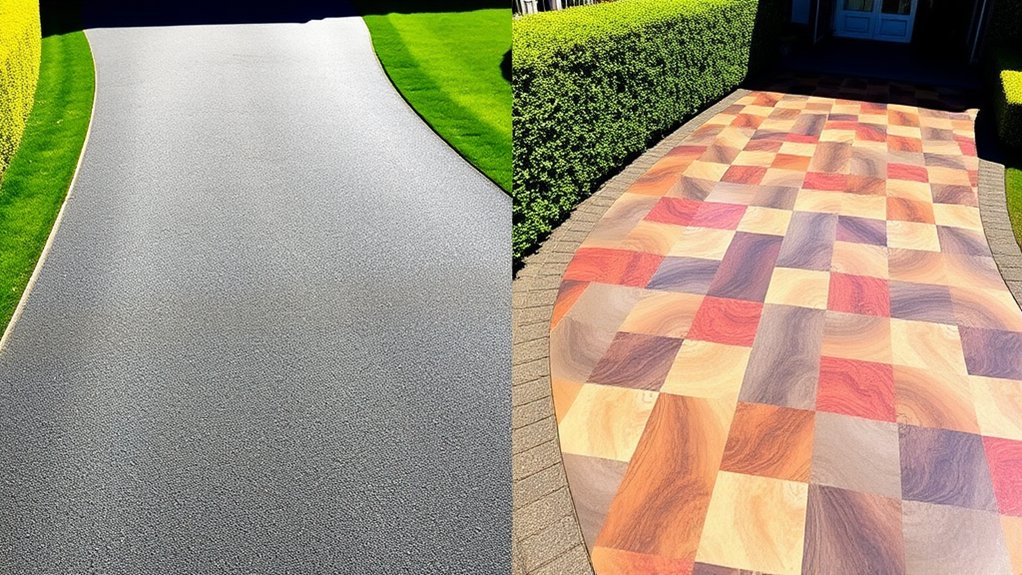
When budgeting for your driveway project, consider the initial costs of installation, which can differ significantly between tarmac and resin.
While resin driveways might’ve a higher upfront cost, they typically require less maintenance and fewer repairs in the long run.
For example, if you opt for resin, you could save on upkeep and potential damage down the line.
Weighing these factors will help you make a decision that suits your budget and future needs.
Initial Installation Costs
Choosing between a tarmac and resin driveway can be tricky, but understanding the initial installation costs is vital for budgeting. Here are some key points to consider:
- Tarmac Costs: Prices range from £20 to £50 per square metre, depending on quality and features.
- Resin Costs: Typically between £50 to £80 per square metre, with higher labour costs due to the complexity of installation.
- Site Preparation: Both options may need grading, impacting costs. However, resin often requires a more substantial base.
- Aesthetic Value: Tarmac can lack visual appeal, while resin offers better aesthetics and permeability, which can justify its higher price.
In the end, consider these factors against your budget to make an informed decision.
Long-Term Maintenance Expenses
When deciding between tarmac and resin driveways, it’s important to consider long-term maintenance costs alongside initial installation expenses.
Tarmac driveways generally need sealing every two to five years, costing around £300 to £400, with annual maintenance ranging from £250 to £800. This frequency is higher than that of resin driveways, which mainly require just cleaning and very little upkeep.
While resin driveways tend to be more durable, repairs can be expensive due to the need for specialised materials.
In comparison, tarmac repairs use asphalt materials, which typically cost between £2 and £10 per square foot.
Therefore, it’s crucial to assess your long-term maintenance costs to make a well-informed decision that suits your budget.
Potential Repair Costs
Understanding potential repair costs is essential for effectively budgeting your driveway project, as it allows you to plan for future expenses.
Here are the key factors to consider:
- Repair Techniques: Get to know common methods such as crack sealing, pothole patching, and resurfacing to grasp the associated costs.
- Material Differences: Repairs for asphalt and tarmac typically range from £1,071 to £4,014, while resin repairs are less common and can be more complex.
- DIY vs. Professional: Minor repairs can often be tackled yourself, but larger issues generally need professional assistance, which will affect your budget.
- Damage Prevention: Regular maintenance is crucial; it can save you from expensive repairs down the line.
Frequently Asked Questions
How Do Weather Conditions Affect Driveway Installation and Longevity?
Weather conditions significantly influence driveway installation and longevity. Temperature changes and moisture can complicate the curing process, leading to potential issues down the line. For instance, installing a driveway during a cold snap or heavy rain can prevent it from setting properly, resulting in cracks or surface damage. To ensure durability and extend your driveway’s lifespan, it’s crucial to aim for optimal weather conditions during installation.
Can I Install a Resin Driveway Over an Existing Asphalt Surface?
Can you install a resin driveway over asphalt? Yes, but ensure proper surface preparation first. Check that the resin is compatible, clean the surface thoroughly, and repair any cracks. This approach helps achieve a durable, seamless finish without the need for extensive demolition.
What Are the Most Common Issues With Asphalt Driveways?
Asphalt driveways often face issues like cracking and potholes. These problems arise from traffic loads, temperature fluctuations, and poor installation. Regular maintenance and prompt repairs are essential to ensure the driveway lasts and remains structurally sound. For example, a small crack can quickly worsen if not addressed, leading to more costly repairs down the line.
How Does Foot Traffic Impact the Durability of Each Material?
Foot traffic significantly affects material durability. For instance, tarmac can develop cracks with heavy use, leading to increased maintenance needs. In contrast, resin is more resilient, enduring wear better and retaining its appearance over time, requiring less frequent upkeep.
Are There Financing Options Available for Driveway Installations?
Yes, there are several financing options available for driveway installations. You might consider personal loans, home equity loans, or financing plans offered by specific companies. These options can help you manage the costs effectively, often providing flexible payment terms and competitive interest rates. For example, a personal loan could allow you to spread the cost over a few years, making it easier to budget.
Conclusion
When deciding between tarmac and resin driveways, think of it like choosing a sturdy backpack for a hike. Tarmac is like a reliable canvas bag—rugged and budget-friendly. Resin, on the other hand, resembles a sleek, lightweight pack that’s visually appealing. Both options serve their purpose, but your choice will depend on your budget and personal style. Consider the costs of materials, installation, and long-term maintenance to find the best fit for your driveway project.
How can a tarmac driveway enhance your home's appeal? Discover the key aspects of cost, installation, and maintenance in our Read more
Not sure if you can lay tarmac over your existing driveway? Discover the crucial steps and benefits you need to Read more
Overview the cost differences between tarmac and resin driveways to discover which option truly delivers value and longevity for your Read more

